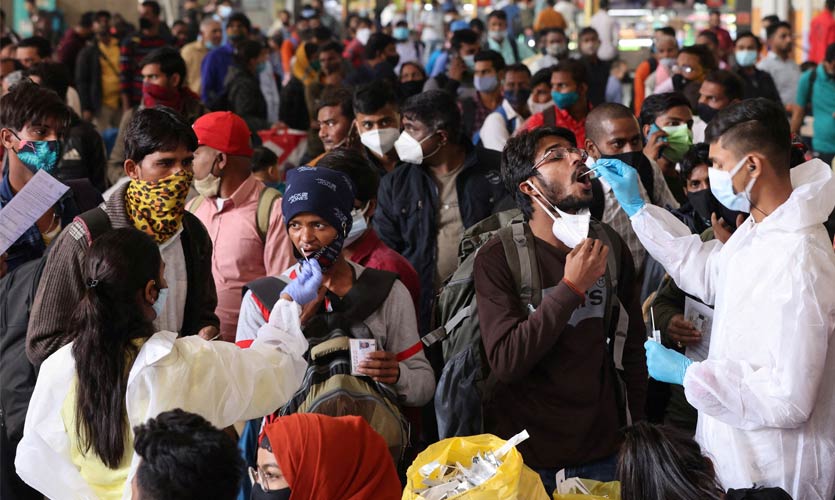As India witnesses a steady decline in COVID cases with the number at its lowest in 662 days on Tuesday, eminent virologist Dr T Jacob John said that he is “fairly confident” that the third wave of the pandemic has ended, and the country has entered the endemic phase. The former director of the Indian Council for Medical Research’s Centre of Advanced Research in Virology said that unless an entirely different variant comes up with unexpected traits, there are less chances of a fourth wave.
“I say [India has entered an endemic phase] since my own definition of an endemic state is low and steady daily numbers, with only minor fluctuations, if any, for at least four weeks. My personal expectation, hence opinion, is that we will be in the endemic phase for more than four weeks. All states in India show the same trend, giving me this confidence,” said Dr John in an interview with PTI. He added, “Unless an unexpected variant that behaves differently from alpha, beta, gamma or Omicron comes, there would be no fourth wave.”
Stating that pandemics occurred in the past due to respiratory transmitted diseases have usually ended after two to three waves, Dr John said, “SARS-CoV-2 will keep on developing mutations and it is possible that some mutations will cause some antigenic drift and such viruses may cause minor outbreaks – mostly few and far between.”
Over virologists earlier predicting no possibility of a third wave too, Dr John said that the Omicron variant, which triggered the third wave, was unpredictable at the moment and the assumptions made at the time were in reference with the existing variants. He explained, “Taking all the available information in India – epidemiological and virus variants – and the global trend, we can be fairly confident that no fourth wave will occur, notwithstanding erudite mathematical model predictions. The model methodology is not valid in this situation.”
However, stressing on the need for constant disease surveillance and gene sequencing, he said that they “ must continue so that we will not be taken by surprise by a mutant variant”.
Dr John’s observations come a week after a study by researchers at IIT Kanpur suggested that the fourth wave of the pandemic might start around June and reach its peak by mid or late August. The study by Sabara Parshad Rajeshbhai, Subhra Sankar Dhar, and Shalabh of the institute’s Department of Mathematics and Statistics states that the fourth wave depends on the new variant and the country’s vaccination status.
“The data indicates that the fourth wave of COVID-19 in India will arrive after 936 days from the initial data availability date, which is January 30, 2020,” mentioned the study, adding, “Therefore, the fourth wave starts from June 22, 2022, reaching its peak on August 23, 2022, and ends on October 24, 2022.”
Mentioning that various factors of the new variant of coronavirus like the variant’s infectibility, fatality, and so on, could alter their analysis, the authors said, “Apart from this fact, the effect of vaccinations – first, second or booster dosage may also play a significant role on the possibility of infection, degree of infection and various issues related to the fourth wave.” They added, “The third wave of COVID-19 was predicted for India using the data of Zimbabwe, and when the third wave in India is finishing, it is now clear that the forecast was correct.”
Earlier in January, officials of the World Health Organization have also warned that more variants of the coronavirus can emerge, and that it is highly risky to assume that the Omicron variant is the last one or that “we are in the endgame”. Stating that “ending the acute phase of the pandemic must remain our collective priority”, WHO Director General Dr Tedros Adhanom Ghebreyesus said, “There are different scenarios for how the pandemic could play out and how the acute phase could end. But it is dangerous to assume that Omicron will be the last variant or that we are in the endgame. On the contrary, globally, the conditions are ideal for more variants to emerge.”
“We simply cannot end the emergency phase of the pandemic unless we bridge this gap. On average last week, 100 cases were reported every three seconds, and somebody lost their life to COVID-19 every 12 seconds,” he had added.
Dr Ghebreyesus said that to end the pandemic as a global health emergency, countries should collectively meet some goals such as the WHO’s target to vaccinate 70 percent of each country’s population by the middle of 2022, with enhanced focus on those who are at a high risk of getting affected and improving testing and sequencing rates to track the virus and its emerging variants more closely.
“It’s true that we will be living with COVID for the foreseeable future and that we will need to learn to manage it through a sustained and integrated system for acute respiratory diseases to help prepare for future pandemics,” he said, adding, “But learning to live with COVID cannot mean that we give this virus a free ride. It cannot mean that we accept almost 50,000 deaths a week from a preventable and treatable disease.”










